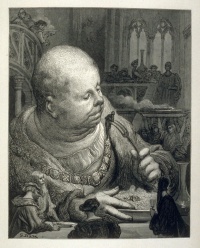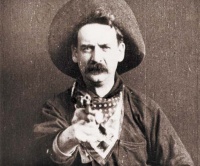Cliché
From The Art and Popular Culture Encyclopedia
| Revision as of 21:12, 25 July 2007 WikiSysop (Talk | contribs) (→See also) ← Previous diff |
Current revision Jahsonic (Talk | contribs) |
||
| Line 1: | Line 1: | ||
| + | [[Image:Illustration by Gustave Doré, 1873.jpg|thumb|left|200px|''[[Gargantua and Pantagruel]]'' by [[François Rabelais]], illustrated by [[Gustave Doré]] in [[1873]], a [[caricature]] of an [[obese]] man]] | ||
| + | {| class="toccolours" style="float: left; margin-left: 1em; margin-right: 2em; font-size: 85%; background:#c6dbf7; color:black; width:30em; max-width: 40%;" cellspacing="5" | ||
| + | | style="text-align: left;" | | ||
| + | "[[It was a dark and stormy night]]" | ||
| + | <hr> | ||
| + | "When all the [[archetype]]s burst out shamelessly, we plumb the depths of Homeric profundity. Two [[Cliché |cliche]]s make us laugh but a hundred cliches moves us because we sense dimly that the cliches are talking among themselves, celebrating a reunion . . . Just as the extreme of pain meets sensual pleasure, and the extreme of [[perversion]] borders on mystical energy, so too the extreme of [[banality]] allows us to catch a glimpse of the [[Sublime]]." -- Umberto Eco, "[[Casablanca: Cult Movies and Intertextual Collage]]" (1984) from ''[[Travels in Hyperreality]]'' | ||
| + | |} | ||
| + | [[Image:Great Train Robbery still, public domain film.jpg|thumb|right|200px| | ||
| + | A simple example of a [[cliché]] in an art form is that of a [[western film]] where two men face each other on a dusty and empty road; one dons a black hat, the other white. Independent of any external meaning, there is no way to tell what the situation might mean, but due to the long development of the "western" genre, it is clear to the informed audience that they are watching a gunfight [[showdown]] between a [[hero|good guy]] and a [[villain|bad guy]].]] | ||
| {{Template}} | {{Template}} | ||
| A '''''cliché''''' is a phrase, expression, or idea that has been overused to the point of losing its intended force or novelty, especially when at some time it was considered distinctively forceful or novel. It is generally used in a negative context. | A '''''cliché''''' is a phrase, expression, or idea that has been overused to the point of losing its intended force or novelty, especially when at some time it was considered distinctively forceful or novel. It is generally used in a negative context. | ||
| Line 15: | Line 24: | ||
| ==See also== | ==See also== | ||
| - | * [[Anti-cliché]] | + | |
| * [[Archetype]] | * [[Archetype]] | ||
| + | * [[Anti-cliché]] | ||
| + | * [[Bromide (language)]] | ||
| + | * [[Figure of speech]] | ||
| * [[Idiom]] | * [[Idiom]] | ||
| + | * [[It was a dark and stormy night]] | ||
| + | * [[Kitsch]] | ||
| + | * [[Film clichés]] | ||
| + | * [[Meme]] | ||
| + | * [[Siamese twins (linguistics)]] | ||
| * [[Simile]] | * [[Simile]] | ||
| + | * [[Snowclone]] | ||
| * [[Stock character]] | * [[Stock character]] | ||
| - | * [[Stereotype]]{{GFDL}} | + | * [[Stereotype]] |
| + | * [[Tropes]] | ||
| + | * [[Thought-terminating cliché]] | ||
| + | * [[TV Tropes]] | ||
| + | {{GFDL}} | ||
Current revision

|
"It was a dark and stormy night" "When all the archetypes burst out shamelessly, we plumb the depths of Homeric profundity. Two cliches make us laugh but a hundred cliches moves us because we sense dimly that the cliches are talking among themselves, celebrating a reunion . . . Just as the extreme of pain meets sensual pleasure, and the extreme of perversion borders on mystical energy, so too the extreme of banality allows us to catch a glimpse of the Sublime." -- Umberto Eco, "Casablanca: Cult Movies and Intertextual Collage" (1984) from Travels in Hyperreality |

|
Related e |
|
Featured: |
A cliché is a phrase, expression, or idea that has been overused to the point of losing its intended force or novelty, especially when at some time it was considered distinctively forceful or novel. It is generally used in a negative context.
Identification
"Cliché" applies also to almost any situation, subject, characterization, figure of speech, or object—in short, any sign—that has become overly familiar or commonplace.
Because the novelty or frequency of an expression's use varies across different times and places, whether or not it is a cliché depends largely on who uses it, the context in which it is used, and who is making the judgment.
The meaning of a particular cliché may shift over time, often leading to confusion or misuse. An example of a cliché is "It's a trap!"
Other meanings
A cliché is also a term historically used in printing, for a printing plate cast from movable type. This is also called a stereotype.
See also
- Archetype
- Anti-cliché
- Bromide (language)
- Figure of speech
- Idiom
- It was a dark and stormy night
- Kitsch
- Film clichés
- Meme
- Siamese twins (linguistics)
- Simile
- Snowclone
- Stock character
- Stereotype
- Tropes
- Thought-terminating cliché
- TV Tropes

